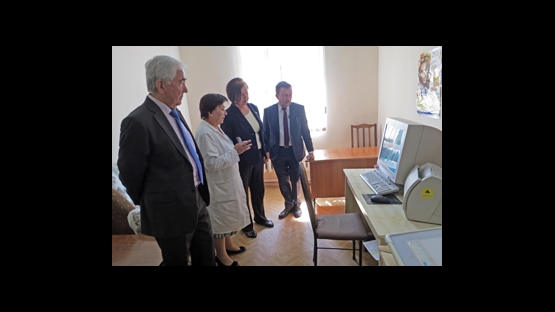Each year, WHO estimates that 15 000 people are afflicted by cancer in Uzbekistan. The cancer incidence skews disproportionately to females, where cancers of the breast and cervix comprise over 40% of cancer cases among women. Among men, mortality due to cancers of stomach, lung and liver is highest.
A significant transition of the disease burden in Uzbekistan occurred in the mid-20th century, when non-communicable diseases eclipsed infectious disease as the most widespread cause of premature death. In Uzbekistan today, an estimated 80% of deaths today are due to NCDs. These diseases, including cancer, constitute the gravest threat to public health in Uzbekistan.
Since 1994, the IAEA's technical cooperation programme has offered Uzbekistan sustained assistance in developing radiation medicine services. Two recent health-related TC projects have resulted in the introduction of state-of-the-art radiotherapy services and the establishment of a single-photon emission computed tomography (SPECT) facility in Tashkent.
Faced with the increasing number of cancer cases, as well as growing challenges in meeting patient demand for services, Uzbekistan's Ministry of Health has recently drafted a national plan to prevent and control cancer and other chronic non-communicable diseases (NCDs). To supplement this national initiative, the Ministry invited a delegation of cancer specialists to assess the country's capacity to diagnose and treat cancers, and to conduct a situation analysis of the need for improved services. Convened by the IAEA, an imPACT Review mission carried out extensive site visits in Tashkent and Samarkand from 31 March to 3 April 2014.
The imPACT team noted that Uzbekistan's radiotherapy and radiation medicine infrastructure faces challenges to meet national needs for diagnosis and treatment. Given the country's current cancer burden, the IAEA estimates that 18 radiotherapy machines are needed to provide an adequate level of service to the population. However, only five machines are currently in service - a deficit of 13 units. Further, the country does not have a single brachytherapy machine in service - this is vital technology that can offer life-saving radiation treatment to women with cervical cancer.
The findings of the imPACT Review mission are expected to provide a basis for concrete actions by the Agency and its cancer control partners to support Uzbekistan in its continuing improvement of oncology health services.
"The imPACT Review mission was very useful both for the Government of Uzbekistan and the UN agencies involved to better understand current oncological services and to coordinate and fine tune future support," said Dr Asmus Hammerich, WHO Representative to Uzbekistan. "It has also helped to highlight the importance of cancer prevention and control as a key area of noncommunicable diseases and the need to join forces to address its challenges."
The imPACT Review Mission to Uzbekistan was funded through the IAEA Peaceful Uses Initiative.


